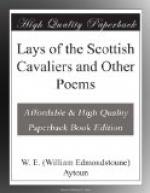“The next morning after the battle,” says Drummond, “the Highland army had more the air of the shattered remains of broken troops than of conquerors; for here it was literally true that
‘The vanquished triumphed, and the victors mourned.’
The death of their brave general, and the loss of so many of their friends, were inexhaustible fountains of grief and sorrow. They closed the last scene of this mournful tragedy in obsequies of their lamented general, and of the other gentlemen who fell with him, and interred them in the church of Blair of Atholl with a real funeral solemnity, there not being present one single person who did not participate in the general affliction.”
I close this notice of a great soldier and devoted loyalist, by transcribing the beautiful epitaph composed by Dr. Pitcairn:—
“Ultime Scotorum! potuit, quo sospite
solo,
Libertas patriae salva fuisse
tuae:
Te moriente, novos accepit Scotia cives,
Accepitque novos, te moriente,
deos.
Illa nequit superesse tibi, tu non potes
illi,
Ergo Caledoniae nomen inane,
vale.
Tuque vale, gentis priscae fortissime
ductor,
Ultime Scotorum, ac ultime
Grame, vale!”
THE BURIAL MARCH OF DUNDEE
Sound the fife, and cry the slogan—
Let the pibroch shake the
air
With its wild triumphal music,
Worthy of the freight we bear.
Let the ancient hills of Scotland
Hear once more the battle-song
Swell within their glens and valleys
As the clansmen march along!
Never from the field of combat,
Never from the deadly fray,
Was a nobler trophy carried
Than we bring with us to-day;
Never, since the valiant Douglas
On his dauntless bosom bore
Good King Robert’s heart—the
priceless—
To our dear Redeemer’s
shore!
Lo! we bring with us the hero—
Lo! we bring the conquering
Graeme,
Crowned as best beseems a victor
From the altar of his fame;
Fresh and bleeding from the battle
Whence his spirit took its
flight,
Midst the crashing charge of squadrons,




